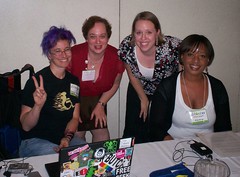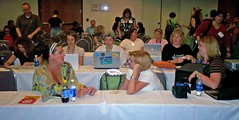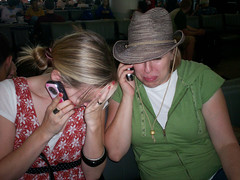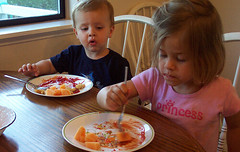 BlogHer felt like an overwhelming success to me this year. I had cute shoes. The conference venue was gorgeous and things ran smoothly and were well organized. People were kind and discussions were thought provoking and respectful. (I’ve got a few words to share on the closing session with Elizabeth Edwards but that will have to wait till tomorrow.) I did not have to cook for anyone and the magical hotel fairies made the beds for me each morning.
BlogHer felt like an overwhelming success to me this year. I had cute shoes. The conference venue was gorgeous and things ran smoothly and were well organized. People were kind and discussions were thought provoking and respectful. (I’ve got a few words to share on the closing session with Elizabeth Edwards but that will have to wait till tomorrow.) I did not have to cook for anyone and the magical hotel fairies made the beds for me each morning.
My panel was on Friday afternoon, led by the excellent Liz Henry, a woman who can make anyone feel at ease and understood. How fun is she to be taking pictures of the panel and audience as she moderated it? That certainly helped relieve some of the nerves I’d been struggling with that morning. To be honest, I felt a little like a fish out of water in that group. There was Laina who writes about race, ethnicity and culture on the BlogHer website, Liz who seems to know everyone, blog on every topic and have one foot in nearly every social group and Tish who regularly stands up against The Man in a male dominated communications blogging culture.

Then there was me with my charmed life, writing a non-issues-based funny mom blog and periodically being touched by drama because of my religious beliefs. I’m much more comfortable being a smart-alec than having a serious discussion about social issues.
 I think the panel went well. We had some good discussion, although I feel that it would have been more productive on a small group level. I wanted the chance to look my fellow panelists in the eye and really come to an understanding of what they were saying, something I’m sad to say didn’t happen.
I think the panel went well. We had some good discussion, although I feel that it would have been more productive on a small group level. I wanted the chance to look my fellow panelists in the eye and really come to an understanding of what they were saying, something I’m sad to say didn’t happen.
In my closing statement, I said that everyone is intolerant of something. In fact, if you’re not intolerant, I’m not likely to be your friend because you’re either lying or you’re so relativistic that you don’t know who you are anymore. We tend to call each other on intolerance when our intolerances don’t match up. Personally, my main intolerance is towards mean people. Why can’t we all just respect each other?
Then I said something that I’m not sure about. I said that through my experiences, I’ve learned that what I love about the internet is that it is a great equalizer, giving everyone the freedom to speak their mind and to form communities of their choosing. I think that the people who spoke out against me because I’m Mormon had the right to do so and can form any exclusive group they want. If I want to have a blog for only people who like lima beans, I can do it and if they want to draw lines based on the Nicene Creed, more power to them. I said that if they didn’t want to include me, then there was no reason for me to want to be included, to beg to be part of their group. That statement doesn’t sit right with me.
In that particular instance, I’m happy for them to have their own little group because it doesn’t affect me in any significant way. However, I know there are so many cases in the world where people are being excluded in a way that is materially harmful to them and to the world at large and some situations need and deserve some direct intervention.
After the panel, two such situations presented themselves. Stefania spoke up in the State of the Momosphere panel and mentioned that she is constantly being pitched marketing opportunities on her various websites but receives none of the same offers for Kimchi Mamas, her successful blog for Korean moms. Kelly from Mocha Momma had started teh converstaion because she has experienced the same kind of exclusion from marketers.
Does it offend me that I am excluded from writing for Kimchi Mamas because I’m white? No. There are approximately one billion places a white woman can blog. I fully believe Korean moms should have access to an exclusive community. But I think it’s wrong that women of color are being excluded in so many other communities. If Club Mom or Parenting were making a point of only hiring white bloggers, I’d have a serious problem with that. So, is it only okay for minorities to be exclusive? I’m not sure where the line is. I just know that some exclusive groups are right and some are wrong.
Another example comes from my co-panelist Laina, who went out to dinner in downtown Chicago and was denied service when a black friend asked for a table but a moment later a white friend was able to get her name down on the waiting list. It blows my mind that things like this are still going on in places other than Uncle Bubba’s small town café in Backwardsville, US. Seriously? How can this country have come so far, and still have such a disconnect between our perceived shared values and the way people actually treat each other?



